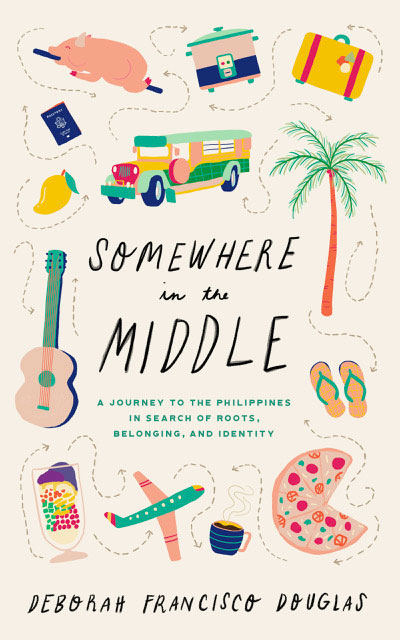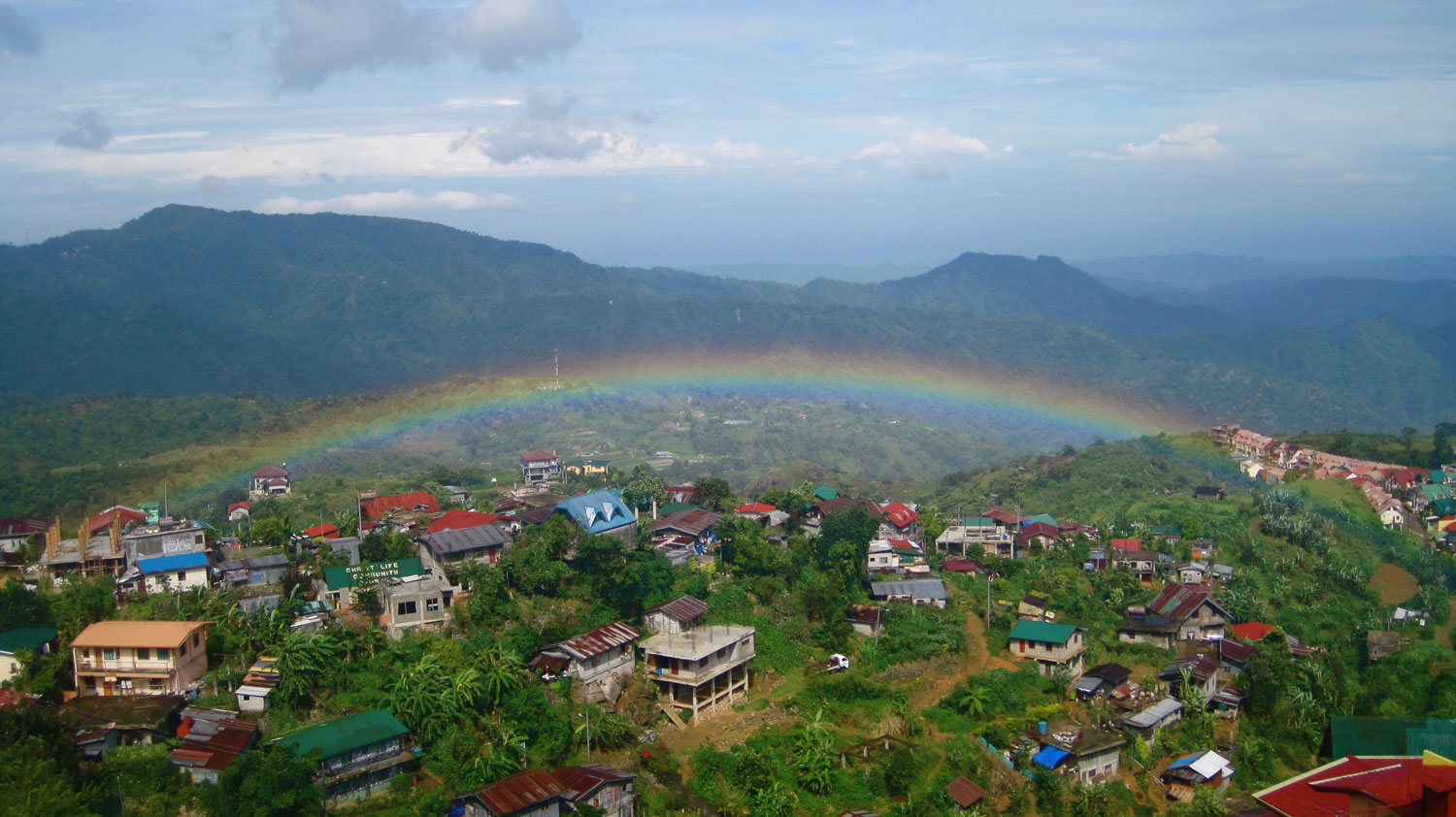Watch Out World: Somewhere in the Middle, Deborah Francisco Douglas Finds Her Way Home
/Book Review:
Somewhere in the Middle: A Journey to the Philippines In Search of Roots, Belonging, and Identity by Deborah Francisco Douglas (Peaceful Mountain Press, 2019)
Somewhere in the Middle: a memoir filled with warmth and humor of a half Filipino but raised in an American household.
The recently published memoir is a youthful, refreshing take on San Diego resident Deborah Francisco Douglas’ three-year stint in the Philippines as a Peace Corps volunteer from 2011 to 2014. Having been raised in America, the author discovers the Philippines for the first time.
Deborah Francisco Douglas was a Peace Corps volunteer assigned to the Philippines from 2011-2014.
The 30+ chapters tells us of the author’s time spent in Baguio. The first-person account is a revelation of what we often take for granted. For Filipinos in the diaspora, the book opens our eyes. It leaves the reader with the same questions the author had. Are we Filipinos? Are we Americans after having lived abroad for decades? Or are we half of each?
When she meets people for the first time in the Philippines, the persistent question is: “What are you?” Was she Filipino? Or American? Deborah replies she is American, and that her mother is Slovenian-Irish-French. Folks insist she is not pure American, having a Filipino father, is from Iloilo. Deborah ponders who she really is.
“When I went to the Philippines, I had these expectations of what I was going to learn, see or do. The experience turned out differently.”
In her memoir, Deborah Francisco Douglas takes us by the hand to travel with her from the time she arrives for training in Zambales, then to three years in Baguio. She finds her calling as a music and guitar teacher in the Benquet province. She is instrumental in boosting a music program that transforms the children, the parents and the community into a solid unit.
Banaue, Ifugao
The reader feels the school’s camaraderie that grows with enthusiasm the longer Deborah and her colleagues work hard to bring music learning to the students. One feels the zeal and excitement during the casual “music café concerts” Deborah organizes to showcase the youthful musical talents. As a reader, you find yourself cheering on teachers, students and parents.
“I spent time resisting what I was learning.” But Deborah plows through. She suggests, “Speak the language, be it Tagalog or the dialect. Use it as much as you can.”
In her self-discovery, she finds things to love in the Philippines. She adores the brightly woven fabrics characteristic of Baguio and Benquet. She describes a handwoven tapis skirt – the Filipino version of a wrap-around garment. Then there are her coffee memories of Sagada roast, Kalinga and Benguet Blend which linger on. And there is the incredible food.
A scenic view of Ifugao.
“You know you’re Filipino when it gets super-hot and the first thing that pops into your mind is a halo-halo dessert.”
She finds happiness in the adventures, the mishaps and the daily challenges unique to life in the Philippines – and which could only be fully understood if one lived there.
She asks herself, “Was there a way to make my two worlds unite?” She describes how this is important to her and the key to finding out where her place in the world is.
As a Peace Corps volunteer, one is not given the option to choose a country or city. So, the Douglas feels she lucked out when she was assigned to the Philippines, where her father was originally from.
The author describes life in the rural part of the country with poetic prose. Her thoughts put into words are lyrical, melodious, and vivid descriptions of the Philippine scenery. Readers are transfixed as we feel through her senses. Even ordinary dirt roads and muddy streets hold their own magic. One feels the air lashing at your cheeks, whipping your hair in the wind as you ride with Deborah on a motorbike, a pedicab or a jeepney.
With short anecdotes, Deborah introduces you to the people who fill her days – neighbors, students, colleagues, host families, even strangers who become friends. They leave an indelible mark in your heart for their sincerity, hospitality and smiles.
The author, Deborah Francisco Douglas, had always longed to know more about her Filipino heritage.
“I can’t forget the smiles of Filipinos and how friendly our people are even to a stranger. On the street, some random person recognized me as new to the neighborhood. They invited me to coffee, pan de sal and dinner. The hospitality of Filipinos is immeasurable.”
Then there are colorful accounts of her days off from work. When Deborah is not teaching or hanging out with neighbors, she is exploring the mountain provinces. A day of hiking, rock-climbing, wading through waterfalls, then getting caught barefoot in thunderstorms and muddy paths were experiences she would never trade for anything.
Once, when her group explore a cave, they are welcomed by the locals with a large meal upon their return.
She describes it exquisitely: “The steaming pot held native chicken cooked with green papaya in ginger soup. It was traditionally-made tinola, a dish that had become as homey and comforting to me as chicken noodle soup in America. I loved meals like this. All you needed were a few pots of tinola and rice and you could feed a crowd. It embodied community. “
“I could see more clearly what it meant to be Filipino compared to what it meant to be American, and discovered that I didn’t quite fit into either category. There was an ambiguous place somewhere in the middle. That is where I found myself”
As you turn each page, you feel the author’s exhilaration, and even her heartbeat is palpable in her writing. The author has fallen in love with the Philippines.
The phrase bahala na takes on a new meaning for Deborah. It is no longer about leaving things to chance. It is about where the next road will take her. She anticipates with eagerness the next uphill climb, optimistic the challenge will lead to somewhere beautiful – as breathtaking as a rainbow over Ifugao right after a storm.
In the last chapters, the author finally accepts things as they are in the Philippines – a vast difference from the conveniences found in America -- “hot showers and running water, flushing toilets, electric clothes dryers, American peanut butter, pizza with real cheese.”
The memoir shows us that It is in finding ourselves do we truly understand who we are and what our role is in the universe. With a better self-understanding, we learn to like ourselves. By liking what we see, we radiate goodness and happiness and the desire to do something for others. So, the world becomes a better place for all.
As for those who are finding themselves somewhere in the middle just like she did, Deborah advises: “Travel with an open mind. Do not be afraid. “
Somewhere in the Middle: A journey to the Philippines in search of roots, belonging, and identity by Deborah Francisco Douglas (Peaceful Mountain Press 2019) is available on Amazon.
Elizabeth Ann Quirino, based in New Jersey is a journalist and author of the “Instant Filipino Recipes: My Mother’s Philippine Food In a Multicooker Pot” Cookbook. She is a member of the International Association of Culinary Professionals and blogs about Filipino home cooking on her site AsianInAmericaMag.com.
More articles from Elizabeth Ann Quirino







